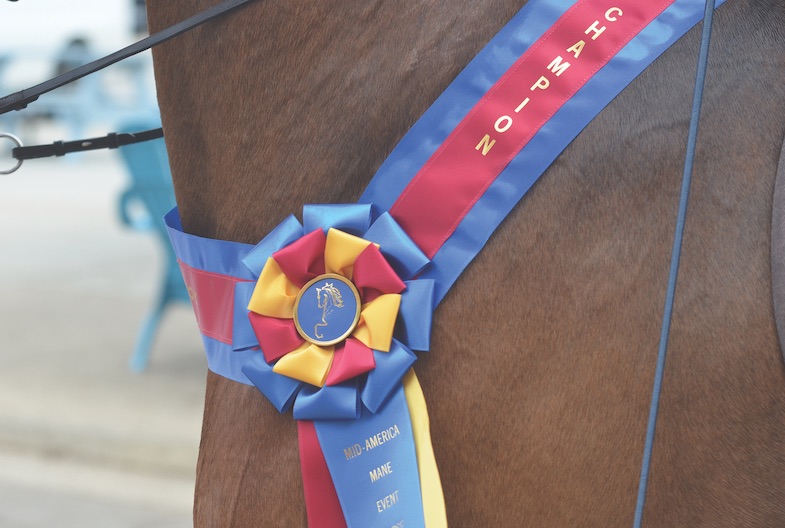
As the COVID-19 pandemic continues, every business sector in the country is affected. This is an unprecedented era, and like everything else, the Saddlebred industry is taking a hit – at a time when everyone should be gearing up for show season. The early spring shows are the place for new teams to debut, junior horses to show off how they’ve grown since their three-year-old season, and seasoned veterans to shake off the winter dust and get back in show shape. Normally, these are important times for anyone who answers the gate call, but this year is going to be different.
Cities and states are becoming more cautious about large gatherings, including horse shows. As of Wednesday, April 1, 27 industry events all over the country have been shut down or closed to the public. There’s no telling how many more will need to be canceled to keep everyone safe. This is hard for all involved. Exhibitors might be disappointed at not getting to make their season debut, but trainers, instructors and barn staff face potential income cuts, and Saddlebred state and regional associations could be struggling to handle things like entry fee returns. What can the average exhibitor do? How can we plan for show season during a time when we are told to #CancelEverything? Is it even safe to go to the barn anymore? There are no easy answers, but some individuals are coming up with unique ideas on how to stay involved with and support the industry during these turbulent times.
A few of those individuals are Danielle Dubay De Navarro and Karly Morgan of Misfit Toys Horse Rescue who have started a virtual horse show with over 75 different classes for horses and 15 classes for dogs. The team hopes to run the show every month until in-person showing becomes possible again.
“It’s a complete dog and pony show, and I’d like to get other rescues involved, too,” Danielle said. “It’s not so much about the money. We’re doing this so everyone has a chance to show.”
If the virtual show is a success, Danielle plans to continue it in future show seasons, because it offers a competition opportunity for horses and riders who aren’t normally able to make it off the farm.
“I have one rescue who’s great, but can’t trailer,” she said.
A virtual horse show lets all exhibitors compete, no matter the situation.

Each entry must submit continuous video of a complete ride performing all the gaits or requirements appropriate for the division. The class list includes performance, academy, breed-specific classes that include hunter and western divisions, as well as fun classes such as stick horse, costume and pasture ornament. A registered judge will call each class, and entries will receive their ribbons in the mail along with written feedback from the judge. Nicole Foster will judge the March event, and Kent Swalla will take over for April. Entries are generally due on the 30th of each month, but the March deadline was extended to April 10 at midnight. Entries cost $25 and all proceeds benefit the rescue.
State Line Tack is also offering a “Seclusion Showdown” online horse show series that can be entered through their Facebook page using photos or video, depending on the class. Their Equitation session will run from April 2-8, and the Showmanship session will run from April 9-15, with different judges for each session.
Since many states and cities have implemented Stay at Home or shelter in place directives, about eight out of 10 Americans are under orders not to leave home except for necessities. That means that, for many people, heading to the barn to make a video for a virtual horse show won’t be possible. However, this creative solution to the current lack of horse shows is ideal for AOT’s who have horses at home. Also, since barn employees are essential agriculture workers, trainers could still video and enter their clients’ horses, which could be an opportunity to earn extra income during this challenging time.
Even if you’re not under a Stay at Home order, it’s important to follow all expert guidelines on how to reduce transmission of COVID-19. The Centers for Disease Control and Prevention ask Americans to avoid leaving home if sick and even if not sick, to keep social contact to a minimum.
“Social distancing” recommendations include limiting non-essential trips into the community, avoiding all gatherings of more than 10 people, and staying at least six feet away from others.
Most equestrians put going to the barn on the list of “essentials,” but right now, barn time (even just to ride and film a video) will likely need to go on pause.
The recommendations for dealing with COVID-19 shift daily, even hourly, and vary depending on the community. It’s a good idea to keep up with these recommendations and keep in touch with your trainer or instructor to see how they’re adjusting their guidelines during this challenging time.
Mary Lynn Foster, owner of Trinity Farm in Indiana, was one of the first instructors in her area to close her barn to the public due to the pandemic.
“I was just following my colleagues in Kentucky,” she said.
As a registered nurse, she understands the importance of using social distancing to keep everyone safe and healthy.
Along with instructors from all over the U.S. and Canada, Mary Lynn participated in Betsy Webb of Louisville Equestrian Center’s 2020 Riding Instructor Workshop at the end of February, and has stayed in touch with many of the other participants.
Although she calls the pandemic a “devastating blow” to her program, she said, “the rainbow of this situation is the collegiality I’m experiencing with other instructors.”
To keep her doors open, Mary Lynn is asking for help through a lesson horse sponsorship program advertised through her newsletter, an idea Cape Cod Equestrian Center shared with her, and one the Joint Leadership Council recommended in their March 24 letter. At Trinity Farm, $100 will sponsor one lesson horse for one week.
“Some people do step up and help,” she said.
Mary Lynn’s goal is “not just to survive this, but to thrive through it.”
“As an industry, we can come out of this,” she said.
Some of the other ideas from the Joint Leadership Council include Tip Your Groom Tuesday, Feed Your Favorite Lesson Horse, and Buy a Round for the Barn. They suggest reaching out to your barn staff to find out how you can help, whether by making sure the grooms are taken care of, making a donation to go towards lesson horse care, or calling a local business and ordering delivery for the barn employees who are still hard at work every day.
The Horsemen’s Relief Fund is another way to help. You can donate through the UPHA website using the Donate Now button and selecting the JLC Horsemen’s Relief Fund through the Choose a Cause dropdown menu. Every penny of all donations will go directly to trainers and instructors who face hardship due to the pandemic. Additionally, Howard Schatzberg Photo and Rick Osteen Photography are donating 10% of all sales for the next 60 days to assist these industry professionals, so now is a great time to pick up a shot from last show season or the Carousel Charity Horse Show. You may also consider donating to your local, regional and national horse associations.
Since the majority of equestrians can’t go to the barn right now, consider these ways of staying in touch with your Saddlebred side during this show season without horse shows.
- Ask your trainer for regular videos of your horse in training.
- Instead of a lesson, schedule telephone calls or videoconferences with your instructor to learn cross-training you can do at home.
- Keep in touch with other Saddlebred enthusiasts. Follow the ASHA on social media, join a Saddlebred Facebook group, or start a group chat with your barn family.
- To get your horse show fix, subscribe to the Richfield Video Archive and watch shows from seasons past.
- Stay active! Part of the joy of going to the barn is the fresh air and exercise. If you have to take a break from riding, get outside and get your heart rate up. You won’t be as sore when you come back for your next lesson.
Remember to offer your trainer and instructor compensation for things like videos and teleconferences, as they’re losing income due to canceled horse shows, camps and riding lessons, and they deserve to be paid for their time.
The most important thing is to stay healthy so you can be ready to show when the time comes, and remember that everyone is in this together. As ASHA board president Marty Schaffel wrote in his March 17 newsletter, “When one of us hurts, we all hurt. We are a very special community of friends and participants. But one thing is certain, as Americans and horse people, we have seen adversity many times, and we have survived it...We will get through this. If this crisis defines us, it will define us as resilient Americans.”



